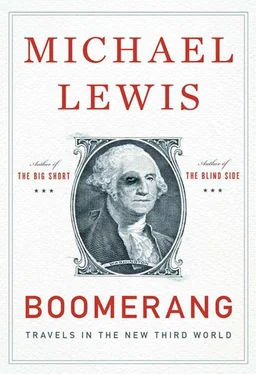It came immediately. Right after the executives took their places at the dais, a shareholder stood up, uninvited, to ask a question. Gleeson, AIB’s chairman, barked, “Sit down!”
“He thought he was a dictator!” says Keogh, who had heard enough. He rose to his feet and shouted, “I’ve listened to enough of your crap! You’re a fucking bastard!” And then he began firing.
“He thought he had been shot,” he says now with a little smile, “because the first egg hit the microphone and went Pow !” It splattered onto the shoulder pad of Gleeson’s suit. The second egg missed the CEO but nailed the AIB sign behind him.
Then the security guards were on him. “I was told I would be arrested and charged, but I never was,” he says. Of course he wasn’t: this was, at bottom, a family dispute. The guards wanted to escort him out, but he actually left the place on his own and climbed aboard the next bus home. “The incident happened at ten past ten in the morning,” he says. “I was home by ten to eleven. At ten past eleven the phone rang. And I was on the radio for an hour.” Then, but briefly, all was madness. “The press descended on the house and they wouldn’t get out,” he says. It didn’t really matter; he wasn’t sticking around. He’d done exactly what he’d planned to do and saw no need to make a further fuss. He flew out of Dublin Airport at six the next morning for a long-planned Mediterranean cruise.
* On July 10, 2011, after a phone-hacking scandal, News of the World was closed.
† Lenihan died in June 2011, seven months after this interview.
IV

THE SECRET LIVES OF GERMANS
By the time I arrived in Hamburg, in the summer of 2011, the fate of the financial universe seemed to turn on which way the German people jumped. Moody’s was set to downgrade the Portuguese government’s debt to junk bond status, and Standard & Poor’s had hinted darkly that Italy might be next. Ireland was about to be downgraded to junk status, too, and there was a very real possibility that the newly elected local Spanish governments might seize the moment to announce that the former local Spanish governments had miscalculated, and owed foreigners a lot more money than they previously imagined. Then there was Greece. Of the 126 countries with rated debt, Greece now ranked 126th: the Greeks were officially regarded as the least likely people on the planet to repay their debts. As the Germans were not only the biggest creditor of the various deadbeat European nations but their only serious hope for future funding, it was left to the Germans to act as moral arbiter, to decide which financial behaviors would be tolerated and which would not. As a senior official at the Bundesbank put it to me, “If we say no, it’s no. Nothing happens without Germany. This is where the losses come to live.” Just a year ago, when German public figures called Greeks cheaters, or German magazines ran headlines like WHY DON'T YOU SELL YOUR ISLANDS, YOU BANKRUPT GREEKS?, ordinary Greeks took it as an outrageous insult. In June of 2011 the Greek government started selling islands, or at any rate created a fire-sale list of thousands of properties—golf courses, beaches, airports, farmlands, roads—that they hoped to auction in order to help repay their debts. It’s safe to say that the idea of doing this had not come from the Greeks.
To no one but a German is Hamburg an obvious place to spend a vacation, but it happened to be a German holiday, and Hamburg was overrun by German tourists. When I asked the hotel concierge what there was to see in his city, he had to think for a few seconds before he said, “Most people just go to the Reeperbahn.” The Reeperbahn is Hamburg’s red-light district, the largest red-light district in the world, according to one guidebook, though you have to wonder how anyone figured that out. And the Reeperbahn, as it happens, was why I was there.
Perhaps because they have such a gift for creating difficulties with non-Germans, the Germans have been on the receiving end of many scholarly attempts to understand their collective behavior. In this vast and growing enterprise a small book with a funny title towers over many larger, more ponderous ones. Written in the early 1980s by a distinguished American anthropologist named Alan Dundes, Life Is Like a Chicken Coop Ladder set out to describe the German character through the stories that ordinary Germans liked to tell one another. Dundes specialized in folklore, and in German folklore, as he put it, “one finds an inordinate number of texts concerning Scheisse (shit), Dreck (dirt), Mist (manure), Arsch (ass). . . . Folksongs, folktales, proverbs, riddles, folk speech—all attest to the Germans’ longstanding special interest in this area of human activity.”
He proceeded to pile up a shockingly high stack of evidence to support his theory. There’s a popular German folk character called der Dukatenscheisser (The Money Shitter), who is commonly depicted crapping coins from his rear end. The world’s first museum devoted exclusively to toilets is in Munich. (A second has opened in New Delhi.) The German word for “shit” performs a vast number of bizarre linguistic duties—for instance, a common German term of endearment once was “my little shitbag.” The first thing Gutenberg sought to publish, after the Bible, was a laxative timetable he called a “Purgation-Calendar.” Then there is the astonishing number of anal German folk sayings. “As the fish lives in water, so does the shit stick to the asshole!,” to select but one of the seemingly endless examples.
Dundes caused a bit of a stir, for an anthropologist, by tracking this single low national character trait into the most important moments in German history. The fiercely scatological Martin Luther (“I am like ripe shit and the world is a gigantic ass-hole,” Luther once explained) had the idea that launched the Protestant Reformation while sitting on the john. Mozart’s letters revealed a mind, as Dundes put it, whose “indulgence in fecal imagery may be virtually unmatched.” Hitler’s favorite word was Scheisskerl (shithead): he apparently used it to describe not only other people but himself as well. After the war Hitler’s doctors told U.S. intelligence officers that their patient had devoted surprising energy to examining his own feces; and there was pretty strong evidence that one of his favorite things to do with women was to have them poop on him. Perhaps Hitler was so persuasive to Germans, Dundes suggested, because he shared their quintessential trait, a public abhorrence of filth that masked a private obsession. “The combination of clean and dirty: clean exterior–dirty interior, or clean form and dirty content—is very much a part of the German national character,” he wrote.
Dundes confined himself mainly to the study of low German culture. (For those hoping to examine coprophilia in German high culture he recommended another book, by a pair of German scholars, called The Call of Human Nature: The Role of Scatology in Modern German Literature .) Still, it was hard to come away from his treatise without the strong sense that all Germans, high and low, were a bit different from you and me—a point he made in the introduction to the paperback version of his book. “The American wife of a German-born colleague confessed to me that she understood her husband much better after reading the book,” he wrote. “Prior to that time, she had wrongly assumed that he must have some kind of peculiar psychological hang-up inasmuch as he insisted upon discussing at great length the state of his latest bowel movement.”
The Hamburg red-light district had caught Dundes’s eye because the locals made such a big deal of mud wrestling. Naked women fought in a ring of filth while the spectators wore plastic caps, a sort of head condom, to avoid being splattered. “Thus,” wrote Dundes, “the audience can remain clean while enjoying dirt!” Germans longed to be near the shit, but not in it. This, as it turns out, is an excellent description of their role in the current financial crisis.
Читать дальше













